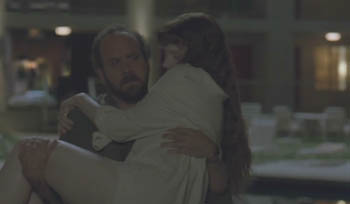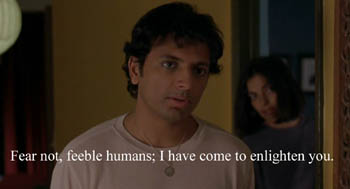|
I don't know why everyone's been so harsh on M. Night Shyamalan's latest offering; I mean, clearly, the man's abilities verge on genius. After all, he admits he orginally conceptualized this tale as a bedtime story for his kids, and what, I ask, is the primary function of a bedtime story? Why, it's intended to put people to sleep, and in this respect, Lady in the Water is a nearly peerless effort. 
The above is what we like to refer to as "bitter sarcasm," and Night's previous film, The Village, provoked it in heaping quantities. This film, which his previous distributor Disney wanted nothing to do with as it was written, was to be his answer to the critics, in the most literal way I've ever seen from a filmmaker. Not an answer in the sense of showing them up or silencing their criticisms, which hilariously failed to happen, but in a sense of simply telling them that they sucked. He might well have titled his opus "An Ode to My Darling Ego." The latest in his series of stories about weird things happening to normal people features Paul Giamatti as Cleaveland Heep, a superintendent at a Philly apartment complex full of credulous idiots who finds a mysterious woman swimming in the pool and discovers, through a series of anecdotes provided by the local Asian stereotypes, that she's a sea being called a Narf who's come to the land of the humans on a mission to inspire one member of the human race to greatness. In a staggering coincidence of truly Biblical proportions, this ultra-brilliant example of humanity is a writer whose lone book on sociology will transform the culture of the world for the better, and just happens to be played by M. Night Shyamalan. Most people have enough inherent modesty to keep their masturbation private, but our modern-day Diogenes has no compunction about symbolically jerking off on the big screen for all the world to see. It could have been a mere plot point had any other individual been cast (and the part could've then actually been well-acted, for that matter), but by putting himself in the shoes of the man destined to save us via his brilliant skills as a wordsmith makes the entire affair an unbelievably arrogant case of self-congratulatory back-patting for which I can think of no cinematic equivalent. Counterpointing this insufferable smugness is the character of the complex's newest tenant, an antisocial, snobbish film critic Cleaveland consults, hoping the man's professional acumen at determining how stories will play out can help him to understand where this legend-come-to-life will ultimately lead. Naturally, the critic is wrong on all accounts, and a complete idiot, as well, evidenced by a questionably humorous scene wherein he encounters a monster and attempts to deconstruct the event, as he would a clichéd plot, in order to determine the likelihood of his survival, a stunning bit of creative legerdemain by which Shyamalan "proves," via a fictional setting and characters, that critics are stupid and can't be trusted. At this point, the question then must become, is the film any good if you ignore all of the none-too-subtle self-commentary? The answer, or at least my answer, is no, not at all. It's amazingly tedious, plodding, and inconsistent. The bedtime story, supposedly of Asian origin, is full of creatures with names like Narf, Scrunt, Tartutic, and just plain "Giant Eagle," which, barring possibly that last one, don't sound eastern in the least. The rules for this unseen fairyland's creatures sound as if he's making them up as he goes, just to provide some complications or rationalizations along the way. The Narf's sacred mission, even if one ignores the meta-meaning, is boring as hell. She meets with the genius writer, after which he feels all tingly and finds his writer's block is not only gone, but so far gone that he finishes the whole book in about a day. He's told that this work will be so controversial that it could bring about his own death if it is published, after which he seems to just blithely accept this, instead of using some of that alleged brilliance to consider publishing under a pseudonym. Problem fucking solved. If the Narf can accurately predict the future, why can't she explain exactly who needs do what in order to get her home again, about which is made much time-wasting fuss? Why can Cleaveland hold his breath for about two seconds near the film's start and then hold it for about two minutes or more a day later? Why can the Narf not explain the nature of her world and its rules one moment, and then explain it in great detail the next? Why is her hoped-for rescuer, the aforementioned eagle, supposedly unwilling to come to her if others are present on the first attempt, and then willing to show itself in front of any and everyone on its second? Why are the lawgivers of this mystic realm supposedly the most evil creatures in it? I thought this other world was the more enlightened one. If the Narf is safe in the water, why doesn't she just stay in the fucking water? The simple fact is that the plot gets shuffled about for convenience's sake as it goes, rules are circumvented by new rules that pop up just in time to keep the story from backing itself into a corner, and the whole thing holds itself up about as well as the Leaning Tower of Pisa. 
As for that life-changing philosophical treatise, we never hear even a smidgen of it, because M. Night Shyamalan doesn't have any words of wisdom, he's just come to tell us that they're Out There Somewhere, and that the best way to find them is to just buy into the notion that whatever bullshit happens to come along is deeply meaningful, the same kind of namby-pamby spiritualism that stank up his shitty Signs movie. The tenants of Cleaveland's apartment complex are a collection of what M. Night obviously thinks are the most stellar examples of humanity, i.e. a pack of uncritical morons who don't even bat an eye when told a lot of delusional-sounding claptrap about sea nymphs and evil monkeys. This is where the man's personal worldview reaches its most nauseatingly precious: it ultimately takes a child to figure out how to help the poor waif get home, because children are "pure" and "unsullied," and "lack higher reasoning," which is why we entrust the governance of our society exclusively to those who still think monsters live under the bed. If only we all could still think so poorly, what a wonderful world it would be. Pardon me while I make like a sea cucumber and barf out all of my internal organs. The sad part is that if you just mute the audio, you could mistakenly think you were watching a potentially decent film. The shot composition is strong and pretty and, well, yes, largely borrowed from Spielberg, but still excellent. I really liked the shot wherein the giant eagle finally arrived; it's truly gorgeous, and has that rare feel of film magic about it that many aspiring, effects-heavy films fail to attain. The man has a good eye, but his mouth blows like a porn star's. The simple fact is that it's impossible to get involved with a story world when you know dick all about said story until the precise moment that a given part of it becomes relevant. Let him direct something written by someone else for once, and see what happens. And next time you want to give your detractors a one-two punch, Mr. Shyamalan, I suggest you forgo the route of mauling them in effigy, and instead try by making a film that doesn't suck ass. I swear I remember liking The Sixth Sense, but that memory is growing dimmer all the time. Maybe I was stupid that day. Obviously it can happen to anyone. -review by Matt Murray
|
|
||||||||